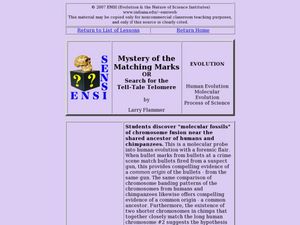Curated OER
The Case Of The Sour Employee
Ninth graders are presented with a problem that has to be solved. The scenario is a mystery that is purely hypothetical. This does draw on the knowledge of previous lessons. The lesson plan contains background knowledge explaining the...
Curated OER
Human Fingerprints: No Two the Same
Sixth graders explore scientific observations by analyzing a group of data. In this fingerprint identification instructional activity, 6th graders identify the reasoning behind fingerprinting and create their own ink fingerprints....
Curated OER
"A Test for Murder"
Students compare and contrast the strengths and weaknesses of their observation abilities as they examine forensic evidence provided by a classroom simulation of a crime committed.
Curated OER
Soil Analysis Lesson Plan
Students practice calculating density and examine examples of the physical characteristics of soil. They solve a "crime" based on the evidence and laboratory investigations.
Curated OER
Toolmarks Lesson Plan
Students examine the scientific method and lab procedures. They solve problems using experimentation, observation, and the scientific method.
Curated OER
Crime Scene Investigation (CSI) with Powdery Mildew Fungi
Students explore a specific method of identifying fungi, using a written key and an illustrated key. Powdery mildew fungi can be identified to genus by the morphology (appearance) of the sexual stage (cleistothecia).
PBS
Conceptualizing an Experiment
Students analyze information from a variety of sources in order to create a hypothesis about the origin of an interesting family artifact. They create alternative hypotheses based upon available information in order to understand that...
Curated OER
Blood Business
Students identify the different kinds of blood. In this biology lesson, students investigate the antigens, agglutinins and Rh factor using their own blood. They use Punnett squares to predict blood type of offspring.
Curated OER
Soil Detectives: The Case of the Lost Friends
Young scholars show how soil varies across the landscape, they explain how soil can be used to solve mysteries. Pupils are introduced to techniques that would be used to distinguish soils from different places.
Curated OER
Biotechnology: Drug Delivery and Diffusion
Students discover advances in biomedical technology such as transdermal delivery and other non-invasive procedures. In lab activities, they examine how medication is given and how molecules travel, observe electrophoresis, and conduct...
Curated OER
Launch Biotechnology into Your Classroom: Drug Delivery and Diffusion
Students distinguish between diffusion and osmosis and describe ways that drugs can be administered. In this diffusion lesson students research career paths and create a presentation to give to the class.
Curated OER
Hydrocarbons
In this hydrocarbon worksheet, students answer 13 questions about different types of organic molecules categorized as hydrocarbons. They explain the different hydrocarbons, they draw structural diagrams for different hydrocarbons and...
Curated OER
DNA Fingerprinting: You Be the Judge!
Students use their knowledge of DNA fingerprinting to evaluate the use fingerprints in courts, and will address the ethics of establishing a national database of fingerprints.
Curated OER
DNA Fingerprinting: You Be the Judge!
Students explore DNA fingerprinting. Students discover how DNA fingerprinting is done and judge the validity. They evaluate the use of certain prints in courts and address the ethics of establishing a national database of fingerprpints.
Curated OER
Classroom Identity
Students explore fingerprints. In this finger prints lesson, students investigate how to classify fingerprints. Students study large pictures of fingerprints and circle the patterns they know how to identify. Students then take their own...
Curated OER
Fingerprinting
Students create a fingerprint card of each of their fingers using a pencil, special paper and tape. A comparison is made with their fingerprints to that of their classmates. They have to analyze how the prints are similar and different.
Curated OER
Mystery of the Matching Marks
Students view a Power Point and complete activities related to genetic evidence of human evolution. In this molecular evolution instructional activity, students view and discuss a provide presentation. They search for the "tell-tale...
Curated OER
Biotech in a Bag
Students carry out a series of experiments using self-locking plastic baggies. Each experiment demonstrates a phenomenon or principle of biotechnology.
Curated OER
To Dig or Not to Dig: The Stadium Showdown
Students examine an ethical public dilemma. In this cultural resource lesson, students role play to examine their personal beliefs regarding the protection of cultural resources. They evaluate possible actions they can take to protect...
Curated OER
Crime Scenes
In this crime scene worksheet, students answer multiple choice questions on different situations involving crime scenes. Students complete 5 questions.
Curated OER
Invent PCR: You May Win a Nobel Prize
Students gain an appreciation for the simplicity, but also complexity and elegance of PCR. They comprehend all components of the protocol. Students explain exactly how CPR works, and why, after the third cycle, the predominant DNA being...
ConnectED
Crime Scene Investigation
How exactly does a crime scene investigation work? The resource, a unit on criminology, covers everything from the deductive reasoning skills needed for detectives to DNA fingerprinting, all the way to how to gather evidence and bring...
Curated OER
Dig Magazine Archeology Quiz #81
In this Dig Magazine archeology quiz, learners answer 4 multiple choice questions complementing the February 2007 issue. Page contains answer and additional resources link.
Other popular searches
- Forensic Science Powerpoint
- Forensic Science Project
- Forensic Science Blood Type
- Vocabulary Forensic Science
- Forensic Science Lab
- Forensic Science Power Point
- Forensic Science Activities
- Forensic Science Fingerprint
- History of Forensic Science
- Forensic Science Entomology
- Forensic Science Archaeology
- Forensic Science Archeology

























